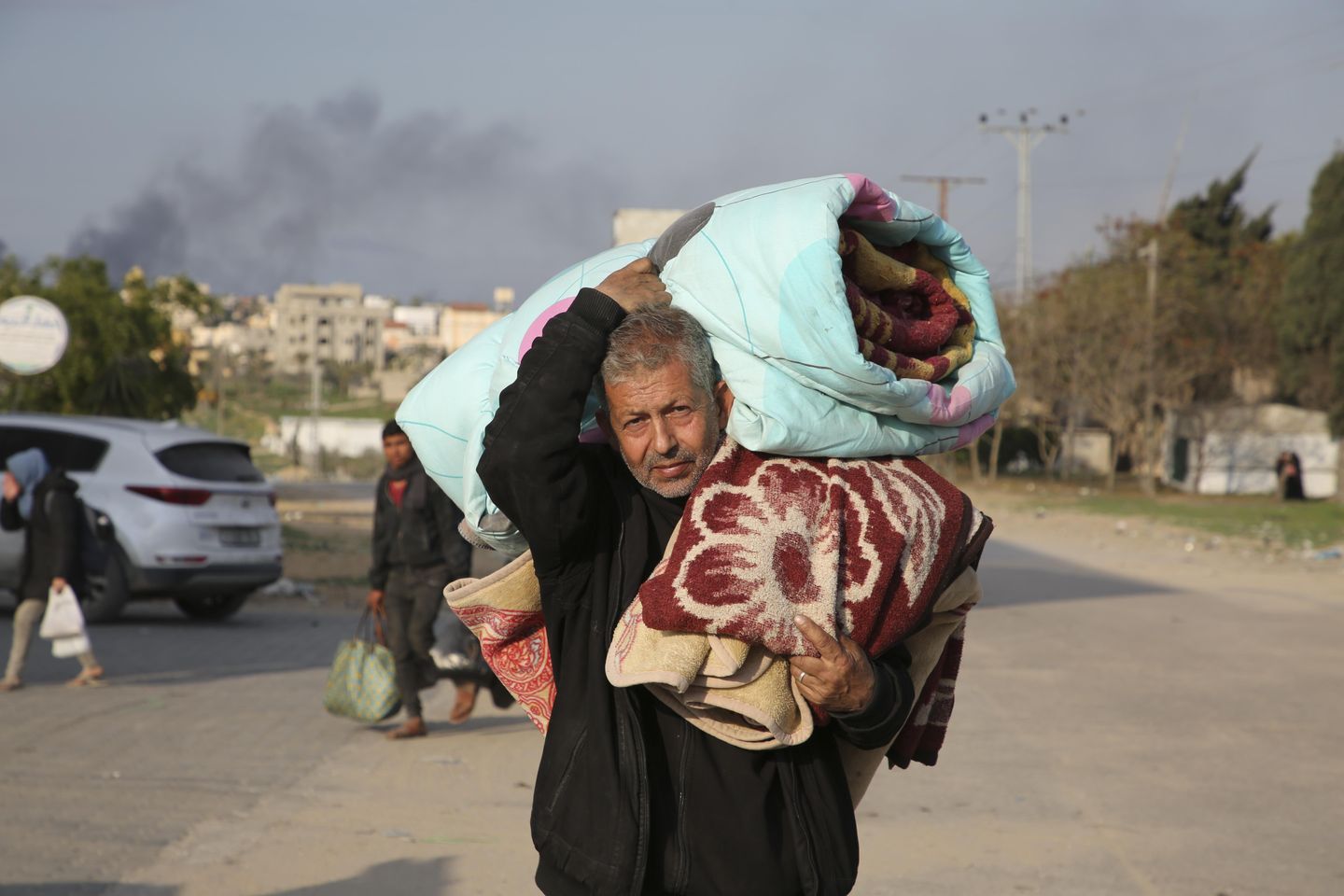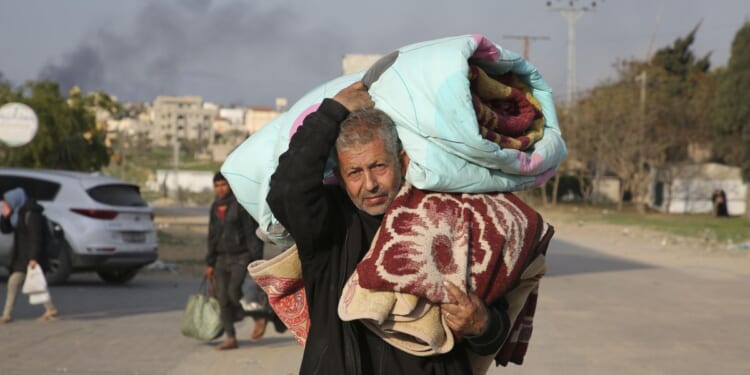
Israeli troops entered the the main hospital in southern Gaza on Thursday in what the army said was a limited operation seeking the remains of hostages taken by Hamas.
One patient died and seven were wounded when Nasser Hospital in the southern city of Khan Younis came under fire on Wednesday, Dr. Khaled Alserr, one of the remaining surgeons at the hospital, told The Associated Press.
Israel accuses Hamas of using hospitals and other civilian structures to shield its fighters. The military said it had “credible intelligence” that Hamas had held hostages at the hospital and that the remains of hostages might still be inside
Israeli airstrikes in southern Lebanon on Wednesday killed 13 people just hours after a rocket attack killed an Israeli soldier in what was the deadliest of daily exchanges of fire along the border since the Oct. 7 start of the war in Gaza.
Negotiations over a cease-fire in Gaza appear to have stalled, and Israeli Prime Minister Benjamin Netanyahu has vowed to continue the offensive until Hamas is destroyed and scores of hostages are returned.
The number of Palestinians killed during the war in Gaza has surpassed 28,000 people, according to the Health Ministry in Gaza. A quarter of Gaza’s residents are starving. About 1,200 people, mostly civilians, were killed and around 250 abducted in Hamas‘ attack on Israel on Oct. 7.
Currently:
– Israeli fire kills patient and wounds others, medics say, as army pushes to evacuate a Gaza hospital.
– Israeli airstrikes killed 10 Lebanese civilians in a single day. Hezbollah has vowed to retaliate.
– A look at the arsenals of Israel and Lebanon’s Hezbollah militia as cross-border strikes escalate.
– Families of Israeli hostages visit international court to urge the arrest of Hamas leaders
– Find more of AP’s coverage at https://apnews.com/hub/israel-hamas-war.
Here’s the latest:
ROME – Israel has formally complained after the Vatican No. 2 spoke of the “carnage” in Gaza by what he termed a disproportionate Israeli military operation following the Oct. 7 Hamas attacks.
The Israeli embassy to the Holy See called the comments by Cardinal Pietro Parolin, the Vatican secretary of state, “deplorable.” In a statement Wednesday, the embassy said he hadn’t considered what it said were the relevant facts on which to judge the legitimacy of Israel’s actions.
Speaking Monday at a reception, Parolin had condemned the Oct. 7 attacks against Israel and all forms of antisemitism. But he questioned Israel’s claim to be acting in self-defense by inflicting “carnage” on Gaza.
“Israel’s right to self-defense has been invoked to justify that this operation is proportional, but with 30,000 dead, it’s not,” he said.
In its statement, the Israeli Embassy accused Hamas of turning the Gaza Strip into “the biggest terrorist base ever seen.” It said Israeli armed forces were acting according to international law and said the proportion of Palestinian civilians to “terrorists” killed was less than in other conflicts in Syria, Iraq and Afghanistan.
But in a front-page editorial Thursday entitled “Stop the Carnage,” the Vatican’s editorial director Andrea Tornielli doubled down on the Vatican position. Tornielli quoted a Rome-based Holocaust survivor, Edith Bruck, who has been highly critical of the Israeli government’s response, which she has blamed on the rise in antisemitic acts against Jews around the world.
CANBERRA, Australia – Canada, Australia and New Zealand are warning Israel that a ground offensive in the Gaza border city of Rafah would be catastrophic.
“We are gravely concerned by indications that Israel is planning a ground offensive into Rafah. A military operation into Rafah would be catastrophic,” the prime ministers of the three nations said in a joint statement on Thursday.
With 1.5 million Palestinians taking refuge in the area where there was an already dire humanitarian situation, the impacts on Palestinian civilians from an expanded military operation would be devastating, they said.
“There is growing international consensus. Israel must listen to its friends and it must listen to the international community,” the statement said.
UNITED NATIONS – The 22 Arab countries at the United Nations are urging the U.N. Security Council to demand an immediate cease-fire in Gaza and unhindered humanitarian assistance, and to prevent any transfer of Palestinians out of the territory.
The Arab Group chair this month, Tunisia’s U.N. Ambassador Tarek Ladeb, told U.N. reporters Wednesday that some 1.5 million Palestinians who sought safety in Gaza’s southern city of Rafah face a “catastrophic scenario” if Israeli Prime Minister Benjamin Netanyahu goes ahead with a potential evacuation of civilians and military offensive in the area bordering Egypt.
Algeria, the Arab representative on the Security Council, circulated a draft resolution about two weeks ago demanding an immediate humanitarian cease-fire and unhindered humanitarian access, as well as rejecting the forced displacement of Palestinian civilians, which has been the subject of intense discussions.
U.S. Ambassador Linda Thomas-Greenfield said last week that the resolution could jeopardize “sensitive negotiations” aimed at achieving a pause in the Israel–Hamas war and release of some hostages taken during Hamas’ surprise Oct. 7 attack in southern Israel.
Riyad Mansour, the Palestinian U.N. ambassador, said Wednesday that there is “massive support” for the resolution and Arab diplomats have had “very frank discussions” with the U.S. ambassador, trying to get American support.
“We believe that it is high time now for the Security Council to decide on a humanitarian ceasefire resolution after 131 days,” he said. “The space is narrowing for those who are continuing to ask for more time.”
Some Arab countries were pushing for a vote on the Algerian draft this week, but several Arab and council diplomats said a vote is now likely early next week, giving more time for negotiations with the U.S. to avoid a veto. The diplomats spoke on condition of anonymity because the discussions have been private.
___
Associated Press writer Edith M. Lederer contributed.












